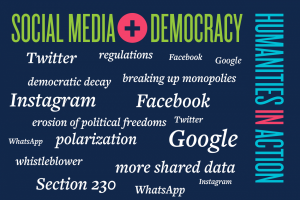UNC Hussman Professor Daniel Kreiss’ October 13 public lecture on social media and democracy

by Barbara Wiedemann
UNC Hussman School of Journalism and Media Professor Daniel Kreiss, whose research explores the impact of technological change on the public sphere and political practice, gave a hybrid public lecture to a Carolina Public Humanities audience on the afternoon of Wednesday, October 13, on social media and democracy. Listeners participated in person at Flyleaf Books in Chapel Hill and from the professionally filmed and mixed live Zoom broadcast.
Carolina Public Humanities bills itself as the public face of the humanities at the University of North Carolina at Chapel Hill. The College of Arts & Sciences program was established in 1979. Lloyd Kramer, long-time UNC history professor, became the program’s first faculty director in 2014.
“Since its inception, the program has been predicated on the idea that knowledge of the humanities — from history to philosophy to literature to the performing arts — equips people to be better citizens of a democracy,” Kramer said at the time.
The programs’ lectures and other series seek a broad North Carolina audience and at the same time, are offered free of charge to UNC OneCard holders, which includes students, staff and faculty. Weekend seminars are also free to students.
The program’s executive director, Max Owre, says that he first assembled the program’s “Humanities in Action” lecture series a decade ago with partner Flyleaf Books, where the lectures are typically held. The lectures are presented in collaboration with UNC General Alumni Association. He built this fall’s six lectures, Owre says, around the rubric of mis/disinformation. Participants have heard from experts on everything from what philosophers call America’s “epistemological crisis” to misperceptions in science to teaching history in K–12 schools.
Kreiss, a principal investigator with the Center for Information, Technology, and Public Life (CITAP) housed at the UNC School of Information and Library Science, presented a framework for the popular current debate which might be boiled down to “Is Facebook destroying democracy?”
He shared social science research findings and argued that measurable democratic decay and the erosion of political freedoms in the United States have a 30-year history that cannot be attributed to any one source. He went on to suggest that while social media platforms and search engines didn’t single-handedly cause polarization, their policies over time may have contributed to the way partisan identity now more strongly shapes our social identities.
What can be done? Internal adjustments continue to be made, especially by the largest of the social media corporations like Facebook (which owns Instagram and WhatsApp) and Twitter. Policy-making to fight polarization online, Kreiss argued, often develops in deeply reactive ways and without regard to unintended consequences. He pointed out that banning political ads from Twitter in late 2019, for example, left political candidates unable to discuss the environment while commercial accounts like BP continued to place advocacy ads. Candidates who were not incumbents and less well-funded candidates were unable to gain followers with paid ads while popular individual accounts like that of then-President Donald Trump (with 67 million Twitter followers, compared to the 26 million followers of all other presidential candidates combined) carried on.
Kreiss also warned that calls for equality have always been polarizing, because they challenge the power of dominant groups. He urged audience members to consider that extremist forces are of more concern to America’s future as a democracy than what is often identified as party polarization.
The ensuing conversation allowed time for a discussion of potential ways to deepen democracy on social platforms: from breaking up the largest companies; to strengthening regulations; mandating more data-sharing and public audits of research; to rewriting Section 230. True to his research roots, Kreiss advocated most strongly for scholarly access to the type of data used by researchers internally which Facebook whistleblower Frances Haugen used to alert first Wall Street Journal readers and then the U.S. Senate and the public at large about alarming findings of negative impacts, especially on young users.
And what of the future of American democracy? “We are facing an unprecedented challenge,” one Zoom audience member shared, drawing parallels to the Reconstruction era (1865–1877) in the United States and the democratically perilous aftermath. “It is going to get much worse before it gets better,” Kreiss agreed.